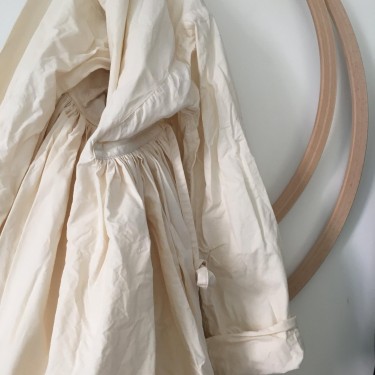
Universal Utility
Universal Utility it a timeless, quality made clothing line made to last a lifetime. The clothing is carefully crafted, without season, time, age or trend.
Articulo 6 is a project by Lucia Cuba that aims to generate dialogues on gender, strength and politics through a range of conceptual and visual elements, a large component of which is a beautifully conceived and produced collection of women’s wear. The visual narrative reflects on gender, strength and politics, with the intent of advancing critical thought with notions of human rights, and the politics of clothes. The project is based around the concept that garments can be used as a medium to inform and raise questions about the topics they touch upon, in this case, the forced sterilizations implemented during the government of Alberto Fujimori in Peru. Cuba’s activistic design project aims to raise awareness about the case.
This is clothing as political statement, clothing as a tool to communicate, design as a means of provoking dialogue, with every design detail used as a reference, to make a point. Clothing plays many roles in our society, acitivism is one not often sighted, and perhaps not the most obvious to many, but as vital and valid a means of communication as any art form, and art has long been used as a tool of rebellion and activism. Cuba’s work draws attention to the fact that clothing is a political and social statement whether conscious or not. We make visual statements of inclusion and support every time we choose to buy or wear a piece of clothing. We support systems and people through our every action, or as in Cuba’s case, choose to draw attention to them through our art. The project consists of 34 pieces of clothing and 12 actions, and explores different narratives related to the case of forced sterilizations. The testimonies of the victims, fragments of political speeches, research documents and laws, are all used as raw material for the project.
The name of the project; Articulo 6; Narratives of Gender, Strength and Politics, refers to the Sixth Article of the Second Chapter in the General Health Law of Peru, which establishes that “all persons have the right to choose freely the contraceptive method they prefer, and to receive appropriate information on the methods available and the risks”. In 2001, a group of 12 brave women from the town of Anta, in Cusco, denounced the violation of their rights and the fact that they had being sterilized without their consent. Fifteen years since the first cases were reported, the case of Forced “Contraceptive Voluntary Surgery” was reopened by the public prosecutor’s office for the third time. According to Cuba, “Now is the time to bring this case to the forefront of public opinion and raise awareness of the need to respect, remember and bring justice to those affected by this vertical and discriminatory public policy that must not be repeated.”
Between 1996-2000, over 300,000 women and 16,000 men were sterilized through a birth control policy applied during Alberto F. Fujimori’s regime in Peru. In many cases the victims/patients were taken to local medical centers with false information, pressuring and sometimes bribing them and their families in order to have the procedures done. Medical procedures where executed without consent, using fake signatures and un-translated consent forms or “agreements”.
The clothing collection is produced through mixed media, including embroidery and prints on cotton twill and cotton canvas. The visual inspiration for the collection is the Andean “polleras” or skirts, subjected to a process of deconstruction and reinterpretation. The coordinating blouses refer to the uniformization and militarization of a public policy, referencing the strength of the victims to defend themselves, while the printed images and symbols on the fabrics cite the institutions, press and characters related to the case. The “12 actions” of the project are still in process, and developed through installations, performances, garments, exhibitions, film, photo shoots, lectures and workshops.
Website: http://luciacuba.com